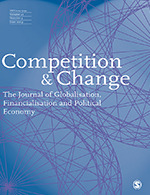Brazil’s national champions strategy (2007–13):
A critical appraisal
Judit Ricz and Michael Schedelik
Competition & Change – Research article – First published online October 13, 2023
Abstract
The recent multiple crises have led to a renaissance of the role of the state in the economy throughout the world. Hence, industrial policy is once again back at the agenda of academic and policy debates in advanced as well as emerging economies. We want to contribute to this debate by discussing the controversial results of a recent case of industrial policy—the “national champions” strategy of the Brazilian National Development Bank (BNDES) between 2007 and 2013. Being the centerpiece of Brazil’s move toward a more state-led economic model in the late 2000s, its successes and failures should be of great importance to the ongoing debate about industrial policy, state capitalism, and development. The national champions strategy has become an integral part of contemporary state capitalist models, with China being the most outstanding example. By looking at the Brazilian case, an upper-middle income democracy, and therefore a more representative case for countries with similar political settings, the paper aims to provide a critical appraisal of revived industrial policies in the early 21st century as a separate policy tool of the newly emerging variety of state capitalism. We apply a political economy approach to highlight the context-sensitivity and institutional embeddedness of firms and the complementarities between several institutional spheres as resources and constraints for companies’ competitiveness and internationalization. The paper aims to contribute to the current debate about state-financed firm internationalization in general and the viability of a national champions strategy in particular.



